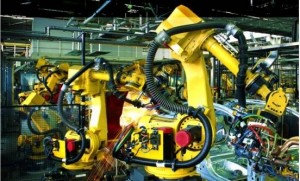“[T]he current jobless recovery, along with a longer-term trend toward income and wealth inequality, has some thinkers wondering whether the latest wave of automation is different from those that preceded it.”
That was Slate.com senior technology editor Will Oremus reporting on a new study from Pew Research and Elon University titled “AI, Robotics, and the Future of Jobs.” The report asked 1,900 economists, scientists, and other experts whether technology and artificial intelligence would replace more jobs than it creates by 2025.
The result of survey was nearly a split decision. 48 percent of these experts said innovation would hurt job growth, surprising considering their high-skilled professions depend on the progress society has made to date. Are they Luddites?
Still, a majority, 52 percent said jobs would not be hurt. Perhaps the reason for that is because, if innovation and automation were supposed to kill jobs, why haven’t they already?
Consider the entire working age population since 1948 has increased 140 percent to 248 million, according to data compiled by the Bureau of Labor Statistics. The number of jobs has more than kept pace, increasing 149 percent to 146 million.
In 1948, the employment-population ratio was 57 percent, and today it’s 59 percent. Despite all of the new automation and conveniences we enjoy today, there’s actually slightly more jobs per capita today than there was during the postwar boom.
Some notes: Prior to the financial crisis, the employment-population ratio did drop a little, from its historic high of 64.5 percent in 2000 down to 63 percent in 2007.
But the real drop in jobs to 59 percent came after the financial crisis, and for reasons directly attributable to the recession. For example, construction (2.3 million) and financial services (700,000) were predictably two of the hardest hit industries in the recession. But, even then they’ve recovered half of their losses — about 1.5 million between the two.
Did automation kill construction and financial services? No, it was overproduction in housing, over speculation on mortgages, and the credit bubble popping. Malinvestment at its worst.
The Slate article does not appear to take how the recession started into consideration, implying that perhaps the failure to recover may be explained by automation.
That may be wrong, but to be fair, it is forward looking piece by design, asking what will happen over the next ten years.
On that question, even if job levels never return to their pre-recession levels, we might question whether the higher employment levels experienced starting in about 1986 all the way through 2007 were predicated entirely on the economic, financial boom, and that all we’re doing now is reverting to the postwar mean.
Which is not necessarily good. The cost of living is far more expensive now. Since 1986, the cost of homes has increased 139 percent per the Freddie Mac home price index, yet median income has only increased 105 percent.
We’re also more burdened by debt. The household debt to household median income ratio has jumped from 88 percent then to 207 percent today, according to data compiled by the Federal Reserve and the U.S. Census Bureau.
In that sense, our current economic difficulties appear to have more to do with the financialization of the economy than anything else, and how that has contributed to a higher cost of living and greater portions of our income going to debt service.
A single income used to be sufficient to sustain a household in the U.S. Now, depending on where you live, in many cases two incomes are needed.
So, perhaps the reason the number of jobs seems relatively scant today is not because we’ve been replaced by robots, but because one needs a job more than ever to get by and to pay back the gargantuan debts we accumulated during the boom.
Innovation has been occurring since the dawn of time. So far, it has resulted in greater productivity, creating new opportunities for individuals to work in areas that were not previously available. As long as these new inventions benefit humanity, then they ought to be embraced, for they are the next step forward.
Robert Romano is the senior editor of Americans for Limited Government.







